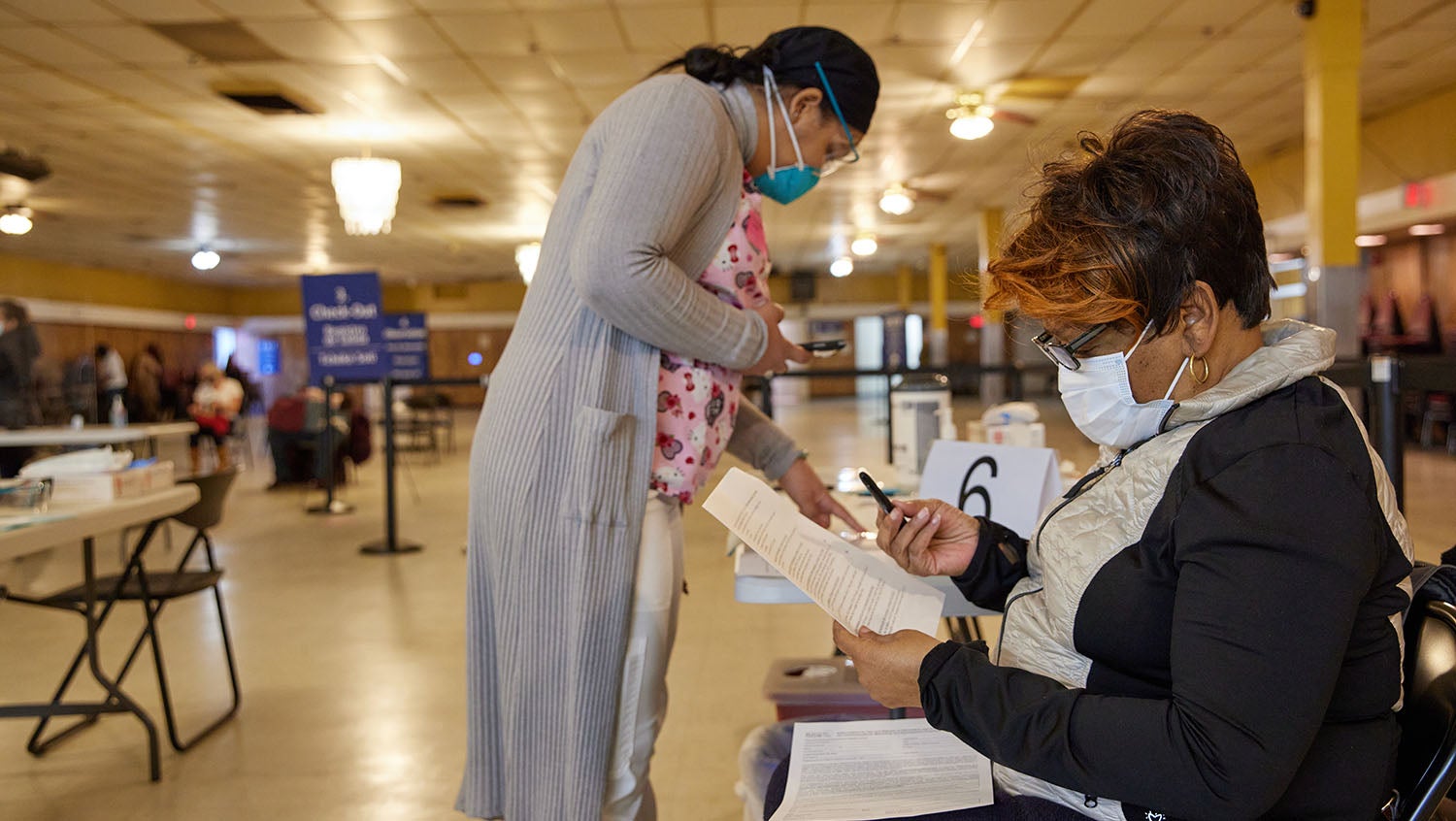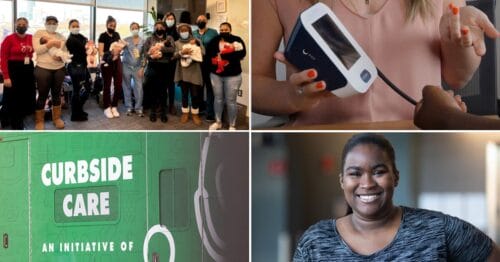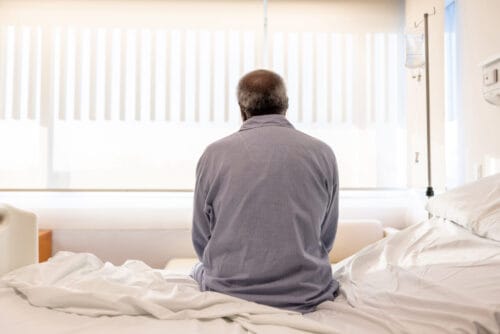Seeking Justice in Healthcare for Black Americans in the COVID-19 Pandemic
April 12, 2021

Adam Knee
A panel examined white supremacy culture and how it drives inequities in COVID-19 testing, care, and vaccine access and offered paths for systemic change.
Black Americans are significantly more likely to contract COVID-19, be hospitalized from it, and die than white Americans. Yet equitable testing, care, and vaccination access still lag behind.
A recent online panel, “COVID-19, Black Communities, and Health Justice,” hosted by the Boston University Center for Innovation in Social Work & Health (CISWH), brought together experts from healthcare, social work, and public health to examine the underlying causes and propose paths forward. Panelists discussed the impact of white supremacy culture and structural racism on the U.S. COVID-19 response. More than 300 people attended the panel on Zoom, which Ellie Zambrano, MSW, LICSW, the executive director of CISWH, moderated.
“Just saying that there are disparities doesn’t help us advance solutions,” said Jon Levy, ScD, professor and chair of Department of Environmental Health at the BU School of Public Health. Levy provided a data-driven look at the course of the pandemic in Massachusetts, demonstrating how communities such as Chelsea, with large percentages of racial and ethnic minorities, were hardest hit. Yet collection of racial data does not tell the full story, as sometimes the collection of this data is incomplete, which can lead to an underestimate of disparities, he said. Additionally, other social determinants can interact with race — such as the number of members in a household or a person’s status as an essential worker.
“We need to move upstream to understand the drivers of these disparities…understanding those causes can help us intervene,” said Levy.
Responses to the COVID-19 pandemic reveal implicit racial bias
Part of the problem lies in healthcare and government responses to the pandemic. Cassandra Pierre, MD, MPH, associate hospital epidemiologist at Boston Medical Center (BMC), discussed how in an examination of billing claims, Black patients exhibiting COVID-19 symptoms were six times less likely to receive testing or treatment compared to white patients.
“Maybe there were differences in health insurance, but it’s really difficult to disentangle implicit racial bias in terms of who gets tested and who doesn’t,” said Pierre, who is also the chair of BMC’s Diversity and Inclusion Council.
For monoclonal antibody treatment, the only approved outpatient treatment for COVID-19, only 6% of Massachusetts recipients were Black, and 6% were Hispanic — while 84% of recipients were white, despite 20% of the therapy being reserved for “structurally vulnerable” populations.
“We know who is more likely to get infected and who is more likely to be burdened by severe complications, but that does not bear out in terms of who is getting the treatment,” said Pierre.
Hesitancy narratives and the COVID-19 vaccine rollout
With the vaccine rollout underway nationwide, inequities continue to persist — though they are not due to the narrative of vaccine hesitancy.
“Communities of color are willing to get this vaccine, but it doesn’t match up to who is getting them,” said Pierre, citing a recent CBS poll showing that 34% of Black adults and 41% of Hispanic adults want the vaccine, compared to 31% of white adults — even though white adults are the group that has received the most vaccinations.
Though Massachusetts ranks third in the U.S. for the largest percentage of Black people who have received at least one dose of a COVID-19 vaccine, there are still great inequities, with 25.7% of white people having received at least one dose, compared to only 16.9% of Black people. These disparities can be traced to scheduling vaccine appointments at times that are not convenient for essential workers, the location of vaccine sites, and a lack of options for people to sign up for slots if they do not have internet access. Notably, many vaccine slots at the Reggie Lewis Center in Roxbury had been filled by white people from more affluent neighboring communities.
“It is a disservice to focus on the vaccine hesitancy story,” said Pierre.
The importance of trusted community partnerships
Efforts that have yielded positive results have incorporated community partnerships, said Pierre, such as the Black Boston COVID-19 Coalition, which partnered with a Black physician group for monthly weekend events where physicians, nurses, pharmacists, and administrative staff were people of color.
Boston Medical Center has worked with faith leaders, activists, community health centers, and community organizations to designate five community vaccination sites in COVID-19 hotspots, Mattapan, Dorchester, Roslindale, Hyde Park, and the South End. Various community health centers also operate mobile vans to deliver vaccines to homebound elders and other less mobile populations.
Denise Octavia Smith, MBA, CHW, PN, executive director of National Association of Community Health Workers, identified another way that healthcare organizations can better serve communities during the pandemic and beyond: partnering more closely with community health workers (CHWs). Throughout the pandemic, CHWs, who are predominantly people of color, have been doing additional work, such as distributing masks, driving people to tests and vaccine appointments, and helping people enroll in benefits through the CARES Act, she said.
National actors have called upon the healthcare system to more fully integrate this workforce to further a community-centered, public health approach to fighting the pandemic, Smith said. Yet, CHWs often remain in a precarious position, often being funded by government grants rather than hospitals, and without a voice in leadership.
“These workers who share the lived experience, the culture, the geography…of some of the most marginalized communities, have difficulty even getting a seat at the table to have their voices heard to begin to support and strengthen public health response,” said Smith.
Additionally, communities are often only engaged in a “downstream” way, she said, for example, only collecting data or being asked to distribute a flyer, but not being invited to help with the development of an intervention. Instead, the leadership and capacity of CHWs should be better recognized and utilized to support COVID-19 response efforts, said Smith. They can include a variety of important tasks, such as co-designing, developing, distributing, and evaluating materials and strategies that respond to community health beliefs, misinformation, and cultural concerns; coordinating and administering screenings for food, housing, financial needs, and mental health services; navigating technology, literacy, language, enrollment, and transportation barriers to ensure access to vaccines and health care; coordinating mobile testing and vaccination sites, and engaging home-bound and homeless community members.
Organizations’ crucial role in pushing for local systemic change
Linda Sprague Martinez, PhD, chair of macro practice and associate professor at BU School of Social Work, also emphasized the need to partner with communities in addressing health equity issues. She called on organizations to step up and take an active role in policy and local initiatives for systemic change in an ongoing manner.
“Think about your relationships, how you do business, your partnerships,” she said. This could look like, among other strategies, weighing in on local zoning laws, changing an organization’s procurement processes, and reallocating funds to community priorities to effect change on the social determinants of health that are the root causes of health inequities.
However, she also noted that organizations need to take a critical look inward at how they can unwittingly be complicit with white supremacy culture and structural racism, furthering health inequities.
“Ideology seeps into policies, neighborhoods, the conditions that impact individual health and wellbeing,” Martinez said. “The longer you’re swimming in a culture, the more invisible it becomes.”
Watch the full video of the “COVID-19, Black Communities, and Health Justice” panel below:
Panel participants:
- Linda Sprague Martinez, PhD, Chair of Macro Practice and Associate Professor, Boston University School of Social Work
- Jon Levy, ScD, Professor and Chair, Department of Environmental Health, Boston University School of Public Health
- Cassandra Pierre, MD, MPH, MSc. Assistant Professor of Medicine, Boston University School of Medicine, and Medical Director of Public Health Programs, Associate Hospital Epidemiologist, Boston Medical Center
- Denise Octavia Smith, MBA, CHW, PN, Executive Director, National Association of Community Health Workers.
- Ellie Zambrano, MSW, LICSW, Executive Director, Boston University Center for Innovation in Social Work & Health
This article is part of a series from the Boston University Center for Innovation in Social Work & Health (CISWH) that highlights social workers working in healthcare and public health to address the nonmedical factors that impact health, known as social determinants of health. Know of a healthcare team that’s doing innovative work involving social workers? Contact us — we want to hear your story.


